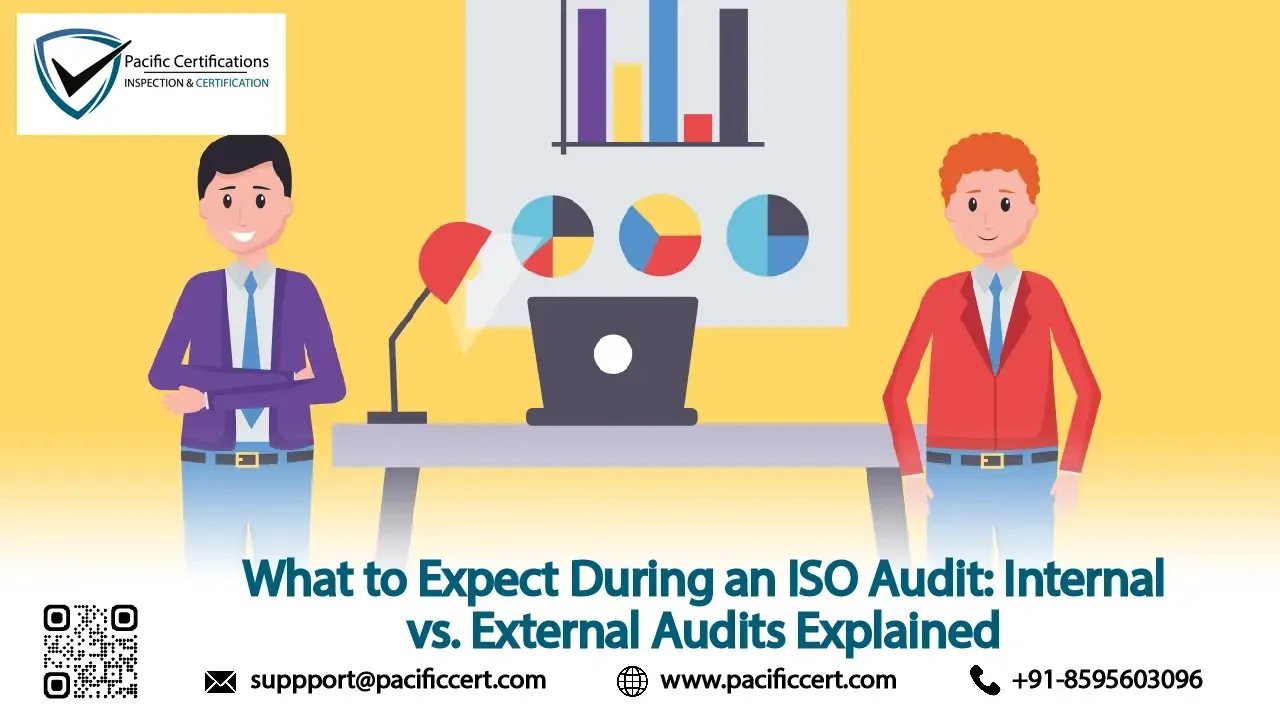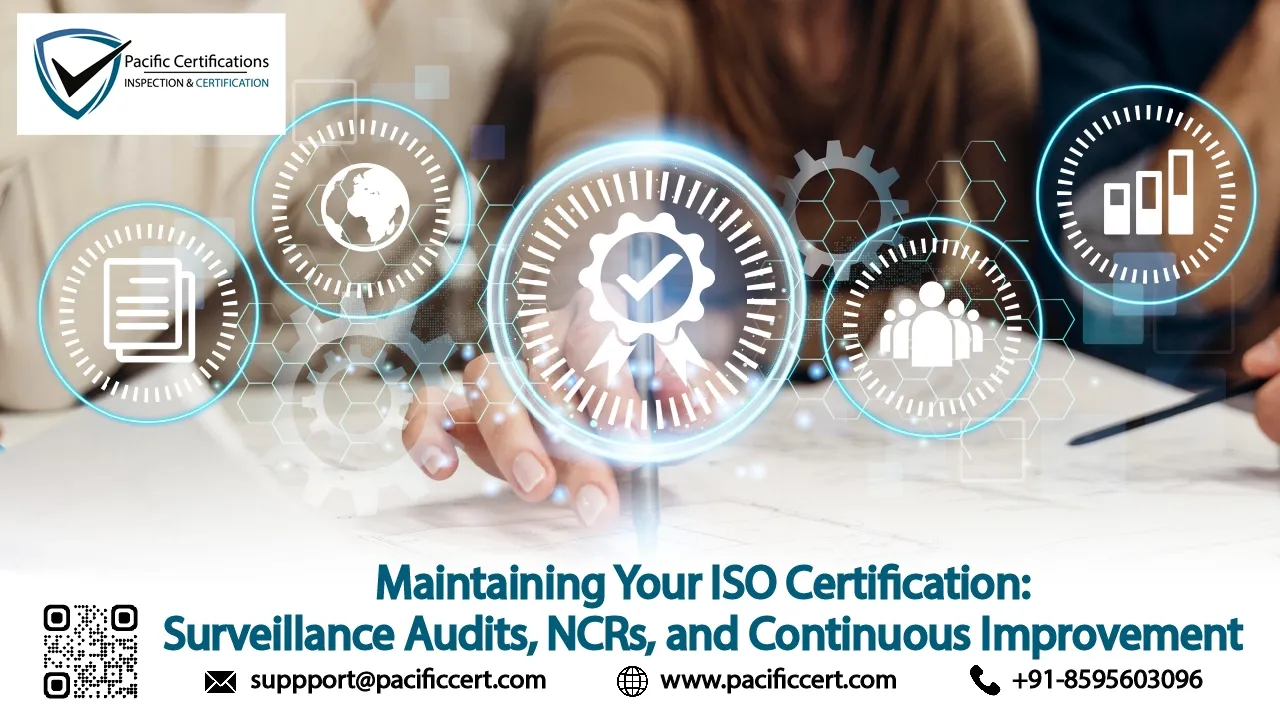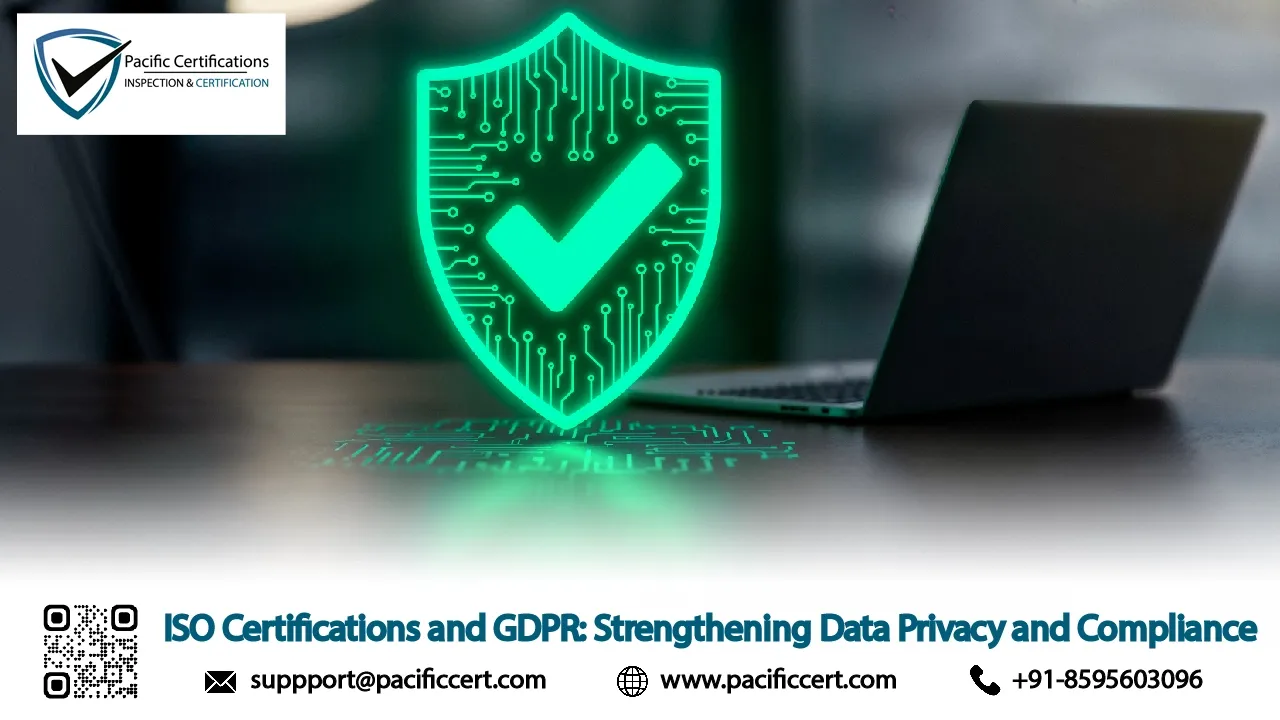
ISO 9001:2015 – Quality Management System
From high-tech electronics and aerospace to oil & gas, agriculture, and logistics, Texas is an economic powerhouse that thrives on productivity, innovation, and scale. As the second-largest economy in the U.S., Texas is home to over 2.7 million businesses, all competing in one of the most dynamic environments in the world.
For organizations across Texas seeking to enhance quality, efficiency and customer satisfaction, ISO 9001:2015 is the international benchmark. This globally recognized standard for Quality Management Systems (QMS) provides the framework to streamline operations and build lasting customer trust.
In this blog, we explore how ISO 9001 is driving excellence across Texas industries, the benefits of certification, and how organizations can implement ISO 9001:2015 to meet state, national, and global quality expectations.
What Is ISO 9001:2015?
ISO 9001:2015 is the most widely adopted standard for quality management, published by the International Organization for Standardization (ISO). It sets requirements for establishing, implementing, maintaining, and continually improving a Quality Management System (QMS) that ensures consistent product and service delivery.
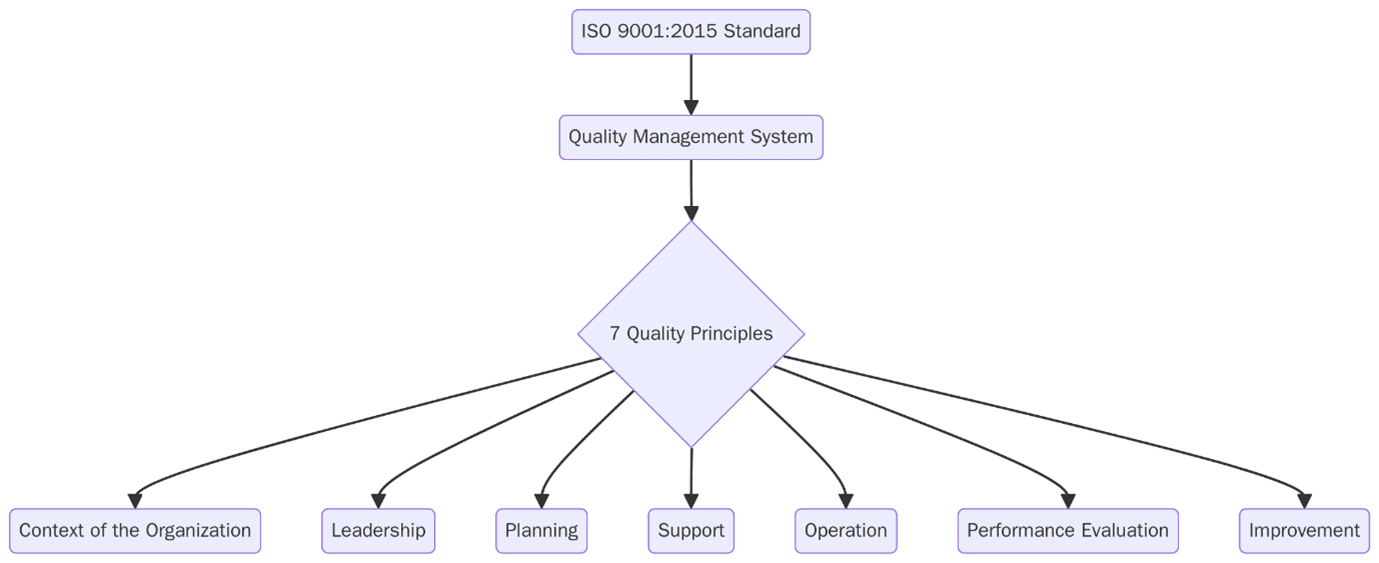
The standard is based on seven quality management principles:
- Customer focus
- Leadership
- Engagement of people
- Process approach
- Improvement
- Evidence-based decision making
- Relationship management
ISO 9001 is flexible and scalable, making it ideal for Texas businesses of all sizes and sectors, whether it’s a Houston-based energy firm, a Dallas IT service provider, or a San Antonio food processing plant.
For QMS certification and audit support in Texas, Pacific Certifications offers on-site and remote ISO 9001 services across all major cities. Contact us at support@pacificcert.com.
Why ISO 9001 Matters for Texas Businesses
Texas is known for its robust business climate, low taxes, and expansive industrial infrastructure. But with rapid growth comes challenges: global competition, regulatory complexity, and rising customer expectations.
ISO 9001 helps Texas businesses navigate these challenges by establishing a clear framework for quality assurance, risk-based thinking, and continual improvement. Certification offers a marketing advantage in industries where performance, consistency, and client trust are non-negotiable.
For manufacturers, ISO 9001 improves production efficiency and supplier relationships. For service providers, it enhances customer experience, complaint resolution, and service delivery metrics. Across industries, it’s a tool for business transformation.
Pacific Certifications offers ISO 9001 certification services in Austin, Houston, Dallas, El Paso, and beyond. Email us at support@pacificcert.com to learn more!
Benefits of ISO 9001:2015 for Texas Organizations
Organizations across Texas are leveraging ISO 9001 to meet both internal performance goals and external compliance demands. Here’s what ISO 9001 delivers:

- Enhances customer satisfaction by ensuring consistent quality
- Increases process efficiency and reduces waste and rework
- Demonstrates credibility to government agencies, suppliers, and clients
- Supports statewide and national regulatory compliance
- Empowers employees with defined roles, training, and involvement
- Fosters a culture of continuous improvement
- Improves supply chain coordination, particularly in manufacturing
- Opens access to new markets through international recognition
For customized certification support in Texas industries like aerospace, energy, or logistics, contact Pacific Certifications at support@pacificcert.com.
ISO 9001 Certification Timeline
The timeline for implementing ISO 9001:2015 in Texas depends on the organization’s size, complexity, and existing process maturity. Here’s a general breakdown:
| Phase | Activities | Estimated Duration |
| Initial Planning | Define scope, assign team, conduct kickoff | 1–2 weeks |
| Gap Analysis | Compare current system vs ISO 9001 requirements | 2–3 weeks |
| System Design & Documentation | Develop QMS policies, processes, quality manual | 2–4 weeks |
| Training & Implementation | Train staff, implement processes, document controls | 3–5 weeks |
| Internal Audit & MRM | Conduct internal audit and management review | 1–2 weeks |
| Stage 1 & 2 Certification Audit | Third-party certification body performs audits | 2–3 weeks |
Typical Total Duration: 3–4 months for SMEs; 5–6 months for large enterprises
Pacific Certifications offers fast-track certification services to help Texas companies meet ISO 9001 timelines efficiently. Book your consultation at support@pacificcert.com.
Steps to Achieve ISO 9001 Certification in Texas
To become ISO 9001 certified, Texas organizations should follow a structured process:
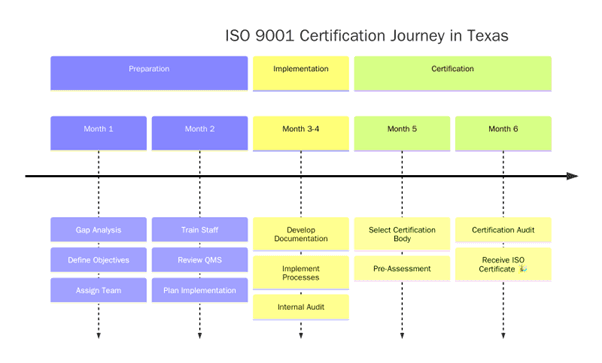
- Define your QMS scope – Which departments, locations, or product lines will be covered?
- Conduct a gap analysis – Identify compliance gaps between your current operations and ISO 9001:2015 requirements.
- Develop QMS documentation – Including a quality manual, process maps, and quality objectives.
- Train your staff – Ensure everyone understands their role in the QMS.
- Implement changes and controls – Apply processes, risk assessments, and KPIs.
- Perform an internal audit – Review for compliance and effectiveness.
- Engage a certification body – Undergo a Stage 1 (documentation) and Stage 2 (implementation) audit.
- Maintain and improve – Conduct annual surveillance audits and management reviews.
Pacific Certifications provides expert support across all these stages with local auditors in Texas. Contact support@pacificcert.com to start.
Leading Industries in Texas Adopting ISO 9001
ISO 9001 is widely implemented across key industries in Texas, including:
- Manufacturing & Aerospace – Dallas-Fort Worth, Houston
- Energy & Oilfield Services – Midland, Odessa, Houston
- Technology & Engineering Services – Austin, Plano, San Antonio
- Construction & Infrastructure – El Paso, Lubbock, Corpus Christi
- Food Production & Packaging – Amarillo, McAllen, Waco
- Transportation & Warehousing – Laredo, Houston, Fort Worth
Regardless of sector, ISO 9001 helps Texas organizations stay efficient, competitive, and globally relevant.
ISO 9001 in Texas – The Standard for Sustainable Growth
As Texas continues to lead the U.S. in business expansion and industrial output, ISO 9001:2015 certification offers a critical foundation for sustainable, quality-driven growth. It aligns processes, improves stakeholder confidence, and positions businesses to scale responsibly in domestic and international markets.
Pacific Certifications, an accredited ISO certification body, works closely with companies across Texas to simplify the certification process and build robust QMS systems that last.
Contact us at support@pacificcert.com or visit www.pacificcert.com to start your ISO 9001 journey in Texas today!
FAQs – ISO 9001 Certification in Texas
What does ISO 9001 certification in Texas cost?
Costs vary by company size, complexity, and number of sites; Pacific Certifications issues fixed-fee quotes after a complimentary gap assessment.
How long is an ISO 9001 certificate valid?
An ISO 9001 certificate is valid for three years, provided the organization passes annual surveillance audits that verify ongoing compliance.
Can small startups become ISO 9001 certified?
Yes. Many Texas tech and service startups pursue ISO 9001 early to boost credibility with enterprise customers and investors.
Does ISO 9001 address environmental or safety issues?
Not directly. ISO 9001 focuses on quality; organizations often pair it with ISO 14001 for environmental management or ISO 45001 for occupational health and safety.
How quickly can we schedule our audit?
Pacific Certifications can usually arrange a Stage 1 audit within about four weeks of confirming your organization’s readiness.
Ready to get ISO 9001 certified?
Contact Pacific Certifications to begin your certification journey today!
Suggested Certifications –
ISO 14001:2015
ISO 45001:2018
ISO 22000:2018
ISO 27001:2022
ISO 13485:2016
ISO 50001:2018
Read more: Pacific Blogs

